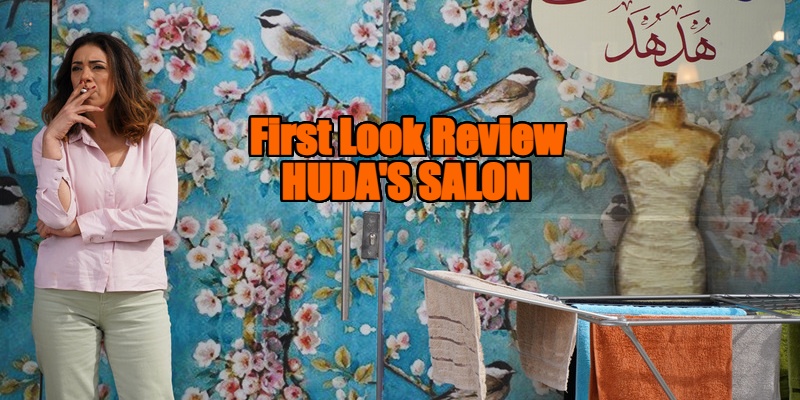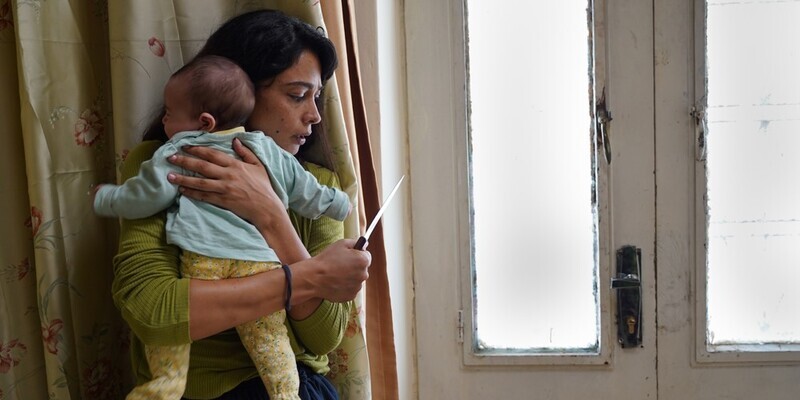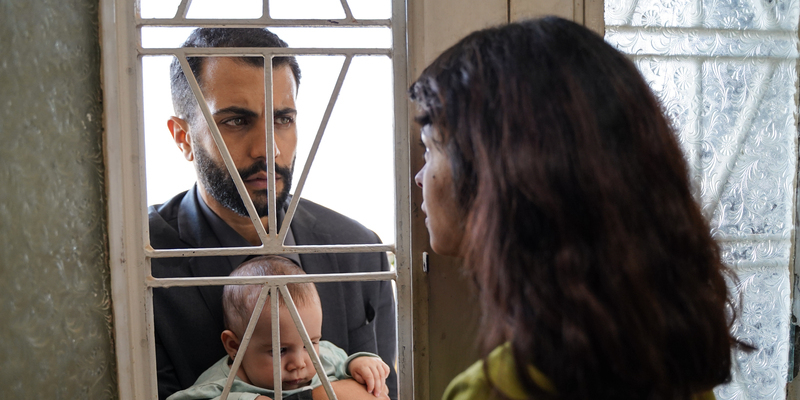
Review by
Benjamin Poole
Directed by: Hany Abu-Assad
Starring: Maisa Abd Elhadi, Ali Suliman, Manal Awad, Omar Abu Amer

I’ve written about the palliative social space of the hair salon - this
nexus of the community, where people go to interact, to relax and to be
transformed -
before. Just as when we step on an aeroplane and put our faith in the pilot,
the crucial dynamic of the barber/client relationship is built on freely
given trust: how you end up looking is entirely in their hands, after all.
Set in the titular shop, the opening moments of
Huda’s Salon trades on our familiarity with the easy
atmosphere of a Hairdresser’s and the gentle gossip passed within.

Two women chat while one, Reem (Maisa Abd Elhadi), has her hair
done by the other, Huda (Manal Awad): lovely. Soothing, even. But
imagine my terror when midway through the ACTUAL WASH, Huda fixes the
unwitting Reem a coffee with a few extra drips of clear liquid in it,
causing her customer to almost immediately pass out. Via a split screen
wall which peels back like something out of The Sting, Reem is then dragged into a back room and onto a positioned bed where
some bloke awaits to remove her clothes as she lies comatose.
This early instance of unwarranted menace, a terror which splits into the
everyday of people simply trying to get on, characterises
Huda’s Salon. Set in Bethlehem, a series of intertitles has already reminded us of
the conflicts which define the West Bank, and it transpires that Reem’s
maltreatment is part of an elaborate blackmail exercise. The woman is
stripped, the bloke too, and Huda takes pictures of them in compromising
positions (utterly horrific): when Reem awakes she is invited to work as a
spy for the Israeli Secret Service, working against the Palestinian
resistance. If not, then Huda will simply send Reem’s husband the
incriminating Polaroids. And Huda knows that Noor (Omar Abu Amer)
is of the jealous, suspicious kind because Reem let it slip earlier. What
hurts most is the betrayal of trust.

Talk about paranoia! What’s more, although Reem is initially distraught
about the blackmail, she soon adapts to the situation in a way that is
unnervingly pragmatic. In a city where exploding bombs can be heard
periodically, you get the impression that she has been half expecting
something terrible to happen anyway.
Writer/Director Hany Abu-Assa’s work has often returned to the
conflicts of his home country and in Huda’s Salon he
examines the haphazard, ad-hoc nature of how both sides operate. For a
start, how effective does Huda realistically think new mother Reem will be
as a spy? It’s a question that could well be rendered moot when Huda
(herself possibly compromised, although the film is too sinisterly vague
to explicate her background) is herself kidnapped and subsequently
interrogated by the secret service: a bunch of men who, like her, seem to
have a limited idea of what they are doing. "You’re a coward playing a
freedom fighter," an unmoved Huda hisses towards her captor.

After the visual flourish of the first scene,
Huda’s Salon settles into an almost theatrical drama. The
storyline pensively cuts between Reem at the mercy of ominous phone calls
and the intense chamber piece of Huda and her captor (Ali Suliman),
interspersing its vacillating conversations with brutal yet numbed
violence. As the plot continues, the possibility of either woman escaping
their situations unscathed becomes increasingly unlikely, and the film
engenders a sense of dread inevitability. Although it never quite
recaptures the thrilling upheaval of its opening,
Huda’s Salon nonetheless grips with the low-key menace of
its ever tightening plot.

Huda's Salon is in US cinemas and on VOD from March 4th. A
UK/ROI release has yet to be announced.

